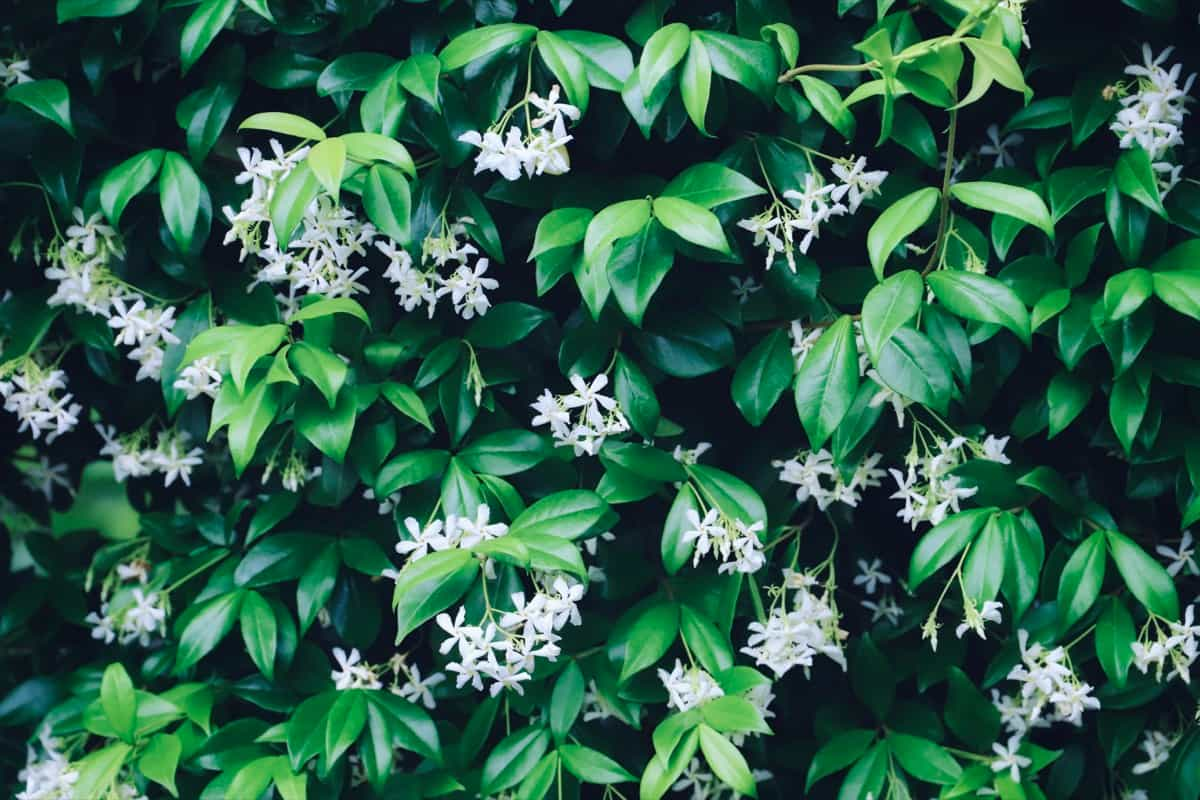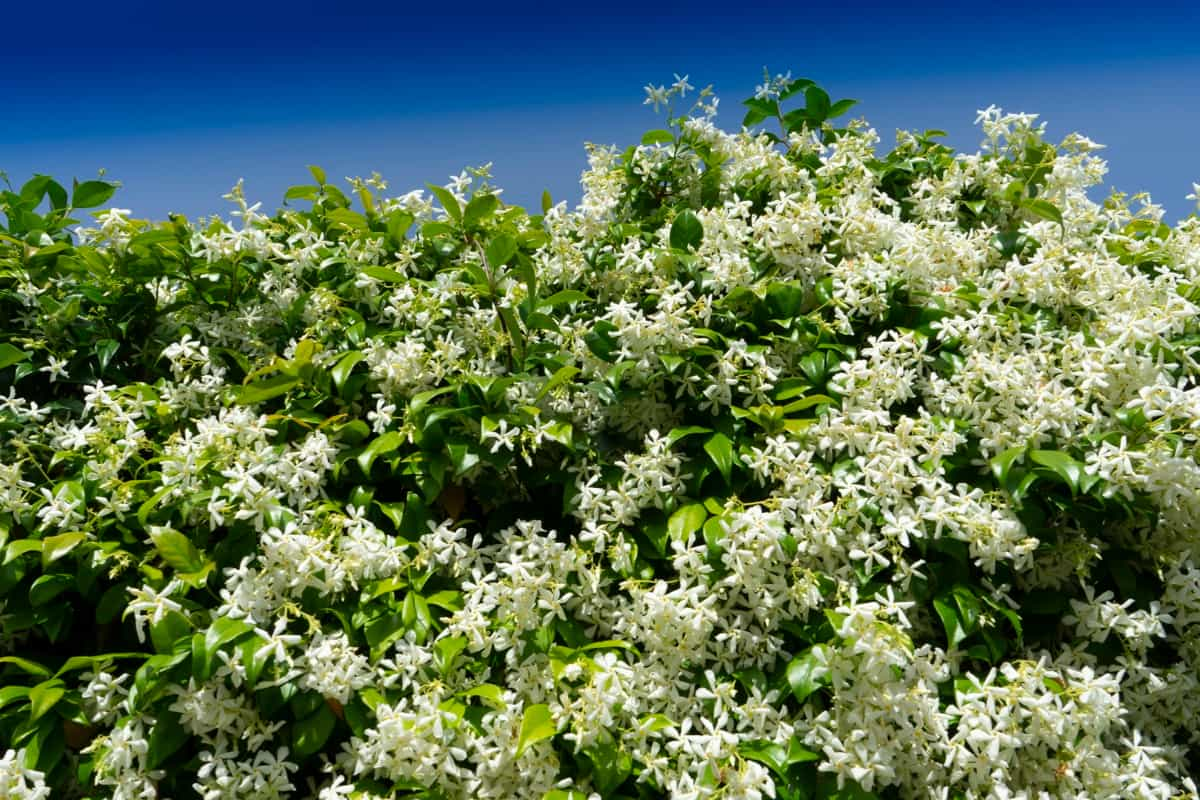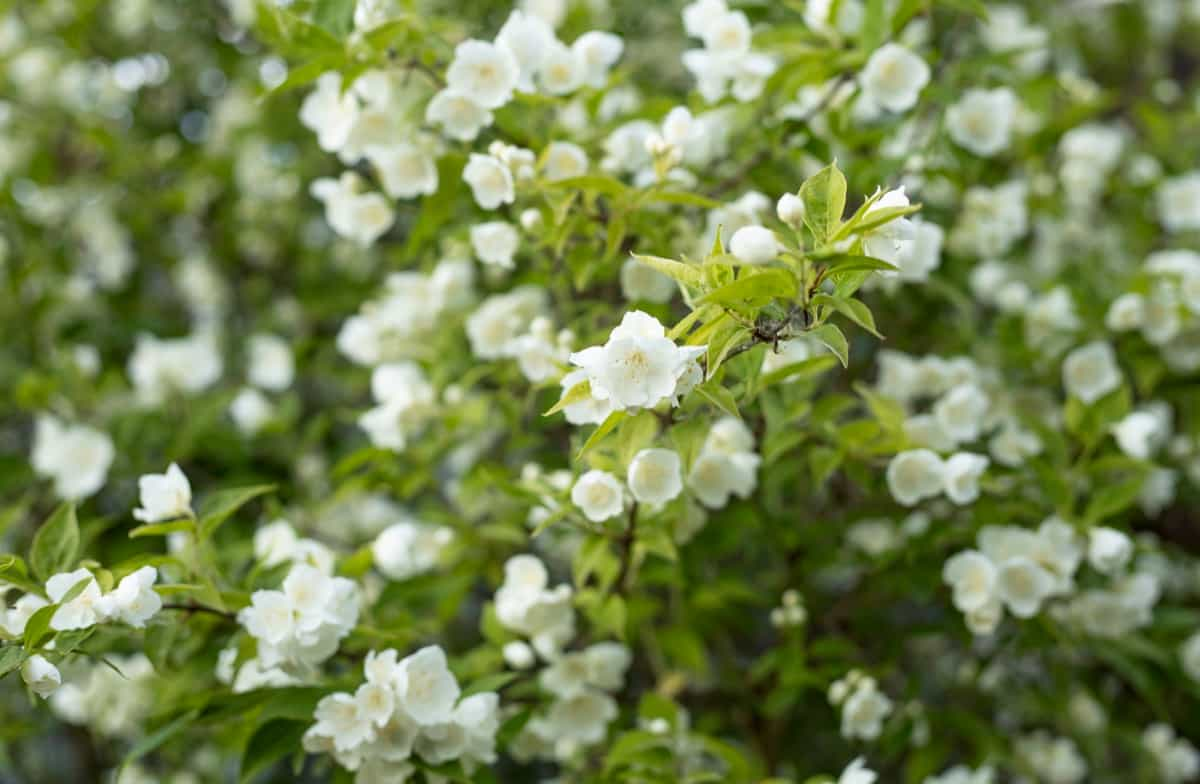Growing jasmine is rewarding since these lovely and fragrant blossoms can infuse any garden with refinement and charm. We will examine how to cultivate jasmine crops, take care of them, and shield them from typical problems that could harm their vitality and health in this extensive tutorial. These organic and natural gardening methods will assist you in maintaining healthy jasmine plants without synthetic chemicals, regardless of your experience level.

How to Control Jasmine Pests Naturally
What is Jasmine Plant?
Jasmine is a genus of flowering plants of the Oleaceae family, with the scientific name Jasminum. Jasmine flowers are commonly utilized in aromatherapy, perfumery, and tea-making because of their delightful and enticing scent. The typical kinds of jasmine are Jasminum officinale (common jasmine), Jasminum sambac (Arabian jasmine), and Jasminum polyanthum (pink jasmine). There are many species of jasmine.
Types of Pests Attacking Jasmine
Jasmine plants are susceptible to various pests that can damage their leaves, flowers, and overall health. Common jasmine pests include aphids, mealybugs, whiteflies, spider mites, and scale insects. These pests can feed on the sap, create honeydew, and distort the plant’s growth.
How Pests Damage Jasmine
Aphids are a prevalent threat to jasmine plants. They consume the sap, which causes the leaves to wilt and change shape. Mealybugs can lead to yellowing and stunted growth, while whiteflies and spider mites affect the plant’s overall vigor. Scale insects can weaken the plant by extracting vital nutrients. To maintain healthy jasmine, it’s essential to address these pests promptly.
Understanding Jasmine Pests: Identifying Common Pests and Their Damage
For efficient pest management, it is essential to comprehend jasmine pests. Pests include aphids, mealybugs, whiteflies, spider mites, and scale insects that frequently harm jasmine plants. Mealybugs cause yellowing and stunted growth, whereas aphids can cause distortions in plant growth and feed on sap.
Scale insects can take out essential nutrients from the plant, and whiteflies and spider mites harm it. The first step in safeguarding and guaranteeing the health and vitality of your jasmine crop is identifying these pests and the harm they do.Choose jasmine varieties that are naturally resistant to common pests. Some cultivars are hardier and less prone to infestations.
Prevention is Key: Implementing Effective Strategies to Control Jasmine Pests
- Begin with healthy seeds or seedlings to ensure a strong foundation for your jasmine plants.
- Avoid planting jasmine in the same spot year after year to prevent the buildup of soil-borne pests.
- Remove weeds and debris that can harbor pests and diseases. A clean garden is less inviting to potential threats.
- Consistently check your jasmine plants for signs of pests and diseases. Early detection allows for swift intervention.
- Practice good garden hygiene by disposing of infested plant parts and maintaining a clean environment.
- Avoid overfertilizing and overwatering your plants since these actions might cause stress and increase their vulnerability to pests.
- Ensure your jasmine plants receive adequate sunlight and proper air circulation.
Natural Remedies for Jasmine Pest Control: Harnessing the Power of Companion Planting
- Marigold: Plant marigolds near your jasmine to repel aphids, whiteflies, and nematodes.
- Chrysanthemum: Chrysanthemums are effective against aphids, mealybugs, and spider mites.
- Nasturtium: Nasturtiums can deter aphids, whiteflies, and squash bugs.
- Lavender: Lavender can help repel mosquitoes and other flying pests in the garden.
In case you missed it: How to Grow and Care for Jasmine Bonsai: Planting Instructions

Organic Treatments for Jasmine Pests: Utilizing Safe and Environmentally Friendly Solutions
- Neem Oil: Neem oil works as a fungicide and pesticide. In addition to preventing fungal diseases, it can manage common pests, including mealybugs, aphids, and whiteflies.
- Insecticidal Soap: A solution of soap and water kills soft-bodied pests by dehydrating and suffocating them. It’s particularly effective against aphids and mealybugs.
- Horticultural Oil: Horticultural oils smother and suffocate pests like scale insects, spider mites, and whiteflies. Use them carefully and follow the product instructions.
Creating a Healthy Garden Ecosystem: Attracting Beneficial Insects to Combat Jasmine Pests
- Ladybugs: Aphids are naturally preyed upon by ladybugs, which can aid in controlling aphid populations.
- Lacewings: Lacewings feed on aphids, mealybugs, and other soft-bodied pests, making them valuable allies for your jasmine plants.
- Parasitic Wasps: These insects parasitize pests like caterpillars and can help control their numbers.
- Predatory Mites: Predatory mites are effective against spider mites, which can be problematic for jasmine.
Homemade Pest Repellents: DIY Recipes to Deter Jasmine Pests Naturally
- Garlic Spray: In a blender with four cups of water, finely chop ten cloves of garlic. After straining the mixture, stir in a few dish soap drops. This may deter other pests like mealybugs and aphids.
- Hot Pepper Spray: Boil 1/4 cup chopped hot peppers in 2 cups water for 15 minutes to make a hot pepper spray. After straining the mixture, stir in a few dish soap drops. This mist may aid in keeping chewing pests away.
Physical Barriers and Traps: Physical Methods to Keep Jasmine Pests at Bay
- Row Covers: Use row covers to shield your jasmine from flying pests and insects like whiteflies and aphids.
- Sticky Traps: Hang sticky traps near your jasmine to capture flying pests and reduce their populations.
- Beer Traps: For snail and slug control, set up beer traps in your garden. The scent of beer attracts these pests, and they fall in and drown, preventing them from damaging your plants.
Summary of Jasmine Pest Control
| Jasmine Pest | Natural/Organic Control |
| Aphids | 1. Spray with a solution of neem oil and water. 2. Release ladybugs, lacewings, or parasitic wasps. 3. Use a strong jet of water to dislodge aphids. |
| Whiteflies | 1. Apply neem oil or insecticidal soap. 2. Introduce beneficial insects like Encarsia wasps. 3. Reflective mulches or yellow sticky traps. |
| Scale Insects | 1. Rub affected areas with a soft brush or cloth soaked in alcohol. 2. Use neem oil or insecticidal soap. 3. Prune heavily infested branches. |
| Spider Mites | 1. Spray with a strong stream of water. 2. Apply neem oil or horticultural oil. 3. Introduce predatory mites or ladybugs. |
| Mealybugs | 1. Dab affected areas with a cotton swab soaked in alcohol. 2. Apply neem oil or insecticidal soap. 3. Prune and dispose of heavily infested parts. |
| Leafhoppers | 1. Use reflective mulches. 2. Plant companion herbs like basil and marigold. 3. Release beneficial insects like lacewings. |
| Caterpillars | 1. Handpick caterpillars. 2. Use bacillus thuringiensis (Bt) spray. 3. Encourage natural predators like birds. |
| Snails and Slugs | 1. Place copper barriers around plants. 2. Use diatomaceous earth. 3. Set beer traps. |
| Fungal Diseases | 1. Prune for better airflow. 2. Apply a baking soda spray for powdery mildew. 3. Use neem oil or sulfur for prevention. |
FAQs Related to Jasmine Pests on Jasmine Pests Naturally
How Do I Identify a Pest Problem with My Jasmine Plants?
Keep an eye out for damage indicators like fading leaves, distorted growth, and the presence of insects. Regularly inspect your plants for any abnormalities.
In case you missed it: How to Make Jasmine Bushy: Best Homemade Fertilizers, Composting and Pruning Tips for Winter, Summer, and Rainy Season

What Should I Do If I Have a Severe Pest Infestation on My Jasmine Plants?
Start with the least toxic methods, such as insecticidal soap and neem oil. If the infestation is severe, consider introducing beneficial insects to help control the pests.
What Is the Most Effective Way to Control Aphids on My Jasmine Plants?
Using neem oil and insecticidal soap is an effective and natural method to control aphids. Companion planting with pest-repelling flowers can also help.
How Do I Deal with A Whitefly Infestation in My Jasmine Garden?
Insecticidal soap and neem oil work well against whiteflies. Attracting beneficial insects like ladybugs can also help reduce their population.
Conclusion
Growing jasmine effectively requires natural and organic treatments, beneficial insect support, and preventive measures. You can keep your garden flourishing and fragrant while safeguarding your jasmine crop from common pests by putting these tips into practice. Using these tips, you may cultivate jasmine in a rewarding and sustainable way, and your plants will thrive in the long run.
- Ultimate Guide to Ossabaw Island Hog: Breeding, Raising, Diet, and Care
- Ultimate Guide to Juliana Pig: Raising Facts, Size, Diet, Care, and Lifespan
- Raising Lleyn Sheep: Disadvantages, Price, Uses, Characteristics, and Care
- Ultimate Guide to Meishan Pig: Breed Facts, Breeding, Raising, and Care
- Ultimate Guide to Teacup Pigs: Raising, Diet, Lifespan, Cost, and Care
- Guide to Raising Poll Dorset Sheep: Facts, Profile, Characteristics, Uses, and Care
- Ultimate Guide to Bighorn Sheep: Characteristics, Diet, Lifespan, Breeding, and Lifecycle
- Ultimate Guide to Raising Katahdin Sheep: Farming Facts, Breed Profile, Uses, and Care
- Ultimate Guide to Raising Oreo Cows: Belted Galloways Farming Facts, Profile, Uses, and Care